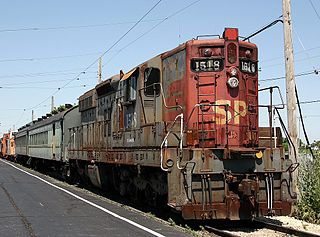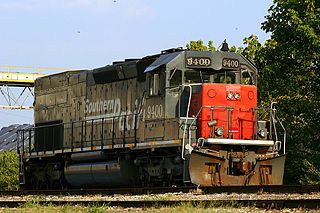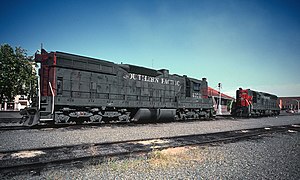
The SD80MAC was a 5,000 horsepower (3.7 MW) C-C diesel-electric locomotive. It was powered by a 20-cylinder version of EMD's 710G prime mover, and was the second diesel locomotive by GM-EMD to use a V20 engine, since EMD's SD45 series. It introduced a wide radiator housing similar to GE Transportation locomotives and the placement of dynamic brakes at the rear of the locomotive, which is a quieter location, features that were incorporated into the SD90MAC and SD70ACe models. Key spotting differences between the SD80MAC and SD90MAC include no external rear sandbox on the SD90MAC, no rear lighted number boards on the SD90MAC, and the placement of the front numberboards. The SD80MAC also had recessed red marker lights in the nose, an identifying feature unique to Conrail (CR) locomotives, although Norfolk Southern (NS) had removed the lights on most of their former Conrail engines.

The GE U25B is General Electric's first independent entry into the United States domestic road switcher diesel-electric locomotive railroad market for heavy production road locomotives since 1936. From 1940 through 1953, GE participated in a design, production, and marketing consortium (Alco-GE) for diesel-electric locomotives with the American Locomotive Company. In 1956 the GE Universal Series of diesel locomotives was founded for the export market. The U25B was the first attempt at the domestic market since its termination of the consortium agreement with Alco.

The EMD SW1 is a 600-horsepower (450 kW) diesel-electric switcher locomotive built by General Motors' Electro-Motive Corporation between December 1938 and November 1953. Final assembly was at EMD's plant at LaGrange (McCook) Illinois. The SW1 was the second generation of 3,402 cu in (55.75 L) switcher from EMD, succeeding the SC and SW. The most significant change from those earlier models was the use of an engine of EMD's own design, the then-new 567 engine, here in 600 hp (450 kW) V6 form. 661 locomotives of this design were built, with a gap in production between March 1943 and September 1945 due to World War II.

The SD7 is a model of 6-axle diesel locomotive built by General Motors Electro-Motive Division between May 1951 and November 1953. It had an EMD 567B 16-cylinder engine producing 1,500 horsepower (1.12 MW) for its six traction motors. United States railroads bought 188 units.

The EMD SD9 is a model of diesel locomotive built by General Motors Electro-Motive Division between January 1954 and June 1959. An EMD 567C 16-cylinder engine generated 1,750 horsepower (1.30 MW). Externally similar to its predecessor, the SD7, the SD9 was built with the improved and much more maintainable 567C engine.

An SDP40 is a 6-axle passenger diesel-electric locomotive built by General Motors Electro-Motive Division (EMD) between June 1966 and May 1970.

The SD45 is a six-axle diesel-electric locomotive class built by General Motors Electro-Motive Division between 1965 and 1971. It has an EMD 645E3 twenty-cylinder engine generating 3,600 hp (2,680 kW) on the same frame as the SD38, SD39, SD40, and SDP40. As of 2023, most SD45s have been retired, scrapped or rebuilt to SD40-2 standards.

An EMD SD45X is a 6-axle experimental diesel-electric locomotive built by General Motors Electro-Motive Division between June 1970 and February 1971. Power was provided by an EMD 645E3A 20-cylinder engine which generated 4,200 horsepower (3,130 kW). 7 examples of this locomotive model were built for American railroads. 6 of these units would end up in service with Southern Pacific Railroad. One was rebuilt in 1980 by Morrison-Knudsen into an SD45Xm with a long hood from a scrapped DD35.

The SD45T-2 is a model of diesel-electric locomotive built by EMD for the Southern Pacific Railroad. Like the later SD40T-2 it is colloquially nicknamed a tunnel motor. 247 total units were produced from February 1972 to June 1975, including 84 for SP's subsidiary Cotton Belt. From April 1986 to December 1989, 126 were rebuilt and re-designated as SD45T-2R, including 24 for Cotton Belt.

The Portland and Western Railroad is a 516-mile (830 km) Class II railroad serving the U.S. state of Oregon, and is a wholly owned subsidiary of shortline and regional railroad holding company Genesee & Wyoming Inc. The PNWR includes a subsidiary, the Willamette and Pacific Railroad.

The Willamette Valley Railway is a short-line railroad that operates in the Willamette Valley of Oregon. It leased a line from Woodburn to Stayton from the Southern Pacific Transportation Company in February 1993, as well as a branch from Geer west to Salem, and purchased the property in 1996. The company also leased a line between Albany and Mill City in 1993, but transferred the lease to the Albany and Eastern Railroad in October 2000.

Southern Pacific Railroad's MC-1 class of steam locomotive consisted of two locomotives built by Baldwin Locomotive Works in April 1909. They are the first two locomotives converted by Southern Pacific (SP) to run as cab forward locomotives.

Southern Pacific Railroad's MC-2 class of steam locomotives was the first class to be ordered by and built for Southern Pacific (SP) as cab forward locomotives. They were built in 1909 following the design of SP's MC-1 class built earlier that year. The success of this locomotive model led to the design and introduction of the AC class of 4-8-8-2 cab forward locomotives in the 1930s and 1940s.

Southern Pacific Railroad's AC-1 class of cab forward steam locomotives consisted of locomotives rebuilt from MC-1 and MC-2 class locomotives that were originally built by Baldwin Locomotive Works in 1909. The MC-2 class was the first class of locomotives built and delivered to SP as cab forward locomotives in late 1909. The AC-1 class was the first of the successful AC series of cab forward locomotives that numbered nearly 200 in total on the SP. Southern Pacific No. 4002 was rebuilt in June 1923 as a Cab Forward.

Southern Pacific Railroad (SP) number 1518 is an EMD SD7, and was the first ever SD series diesel locomotive, originally built in May 1951 as General Motors Electro-Motive Division's (EMD) prototype Demonstrator #990.

Southern Pacific 9010 is a KM ML 4000 C'C' diesel-hydraulic locomotive, built in 1964 by German manufacturer Krauss-Maffei for the Southern Pacific Railroad. SP 9010 generated 4,000 horsepower (3,000 kW) from two 2,000-horsepower (1,500 kW) V16 Maybach MD870 diesel engines. It was painted to Southern Pacific's 1958 standard, the so-called "bloody nose" colors of Scarlet and Lark Dark Gray, for its entire operating career. It was renumbered to SP 9113 in late 1965, rebuilt extensively at SP's Sacramento General Shops during the latter half of 1966, and was initially retired in 1968. It was revived and rebuilt by Sacramento General Shops into a "camera car" for the purpose of shooting motion picture background plates for a ground-based full-motion locomotive training simulator. As camera car number 8799, it was retired in 1984 and donated to the California State Railroad Museum in Sacramento, California. It was de-accessioned by CSRM and acquired by the Pacific Locomotive Association and moved to the Niles Canyon Railway's Brightside, California rail yard in the summer of 2008. At the date of its inception, its type represented the highest-horsepower six-axle diesel locomotives in the world. SP 9010 is the sole surviving ML 4000 C'C' built for use in North America, and the sole surviving mainline diesel-hydraulic locomotive in North America..

The Krauss-Maffei ML 4000 is a road switcher diesel-hydraulic locomotive, built between 1961 and 1969 by German manufacturer Krauss-Maffei in Munich, Germany. It generated 3,540 horsepower (2,640 kW) from two Maybach V16 engines. 37 examples were built for two North American railroads and one South American railroad.
Southern Pacific Company's AM-2 class of steam locomotives was Southern Pacific's (SP) only class of 4-6-6-2 locomotives ordered and built as cab forward locomotives. They were actually MM-2s that had been upgraded. MM-2s were built in 1911 by Baldwin Locomotive Works and entered service on SP beginning September 19, 1911. By 1914, they had all been upgraded with an additional leading axle making them 4-6-6-2 locomotives. They reclassified their MM-2 as AM-2. This was done to improve handling at speed. These locomotives were the predecessors of the AC-12 class cab forward locomotives built during World War II.

The EMD SD45R was a rebuild from EMD SD45 diesel locomotives that were originally built between August 1966 and January 1970 for the Southern Pacific Transportation Company, but were rebuilt by the Southern Pacific themselves under the Southern Pacific's M-99 rebuild program between 1979 and 1985.

The EMD SD7R was a rebuild from EMD SD7 diesel locomotives that were built by General-Motors Electro-Motive Division for the Southern Pacific Transportation Company.


















